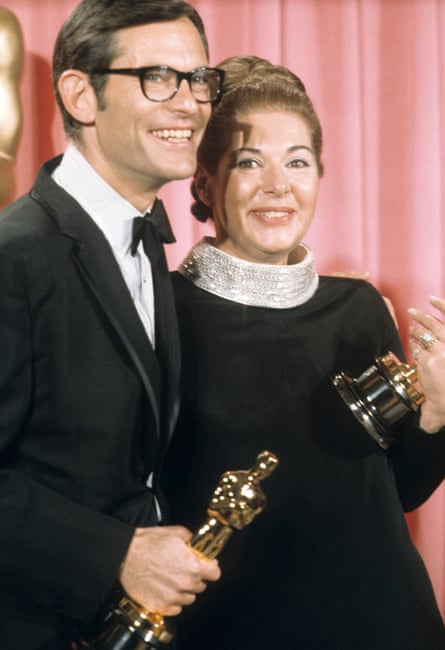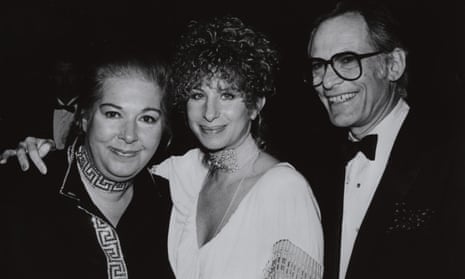The songwriting catalogue of Marilyn Bergman, who has died aged 93, and her husband, Alan, evokes a golden age of Hollywood and popular song, and their compositions were performed by the greatest artists of their era. Their close professional relationship with Barbra Streisand is enshrined in her performance of The Way We Were. The painfully poignant ballad of remembrance and regret was a collaboration between the Bergmans and Marvin Hamlisch and won the Academy award for best original song in 1974, while their composition You Don’t Bring Me Flowers was a US chart-topping duet for Streisand and Neil Diamond in 1978.
The Bergmans had already won an Oscar for The Windmills of Your Mind, a song they wrote with the composer Michel Legrand for the 1968 film The Thomas Crown Affair, and they won a third for their score of Streisand’s film Yentl (1983), another collaboration with Legrand. At the 55th Academy Awards in 1983, the Bergmans had written three of the five nominations for best original song: It Might Be You from Tootsie, If We Were In Love from Yes, Giorgio, and How Do You Keep the Music Playing? from Best Friends (though the winner was Up Where We Belong from An Officer and a Gentleman).
Streisand described the Bergmans as “like family, as well as brilliant lyricists … We met over 60 years ago backstage at a little nightclub, and never stopped loving each other and working together.”
An early milestone in Hollywood was the Bergmans’ work on the 1967 film In the Heat of the Night, where they collaborated with the composer Quincy Jones. Ray Charles sang the title song, notable for its eerie and menacing lyrics: “I’m a-feelin’ motherless somehow / Stars with evil eyes stare from the sky”. When In the Heat of the Night evolved into a TV series in the late 1980s, the Bergmans and Jones resumed their collaboration on the soundtrack.
Outside the movies, the Bergmans wrote a swarm of durable popular standards, including Fred Astaire’s That Face (1957), Dean Martin’s Sleep Warm (1958) and the laidback title track of Frank Sinatra’s album Nice ’n’ Easy (1960), all of these in collaboration with the composer Lew Spence. They also enjoyed a string of successes in television, writing themes for shows including Good Times, Alice and Maude.
They won Emmy awards for the score of the TV movie Sybil (1976), the song Ordinary Miracles (from a Streisand concert special in 1995), and the song Ticket to Dream, composed for the American Film Institute’s 1998 TV special 100 Years ... 100 Movies.

Marilyn was born in New York, in the same Brooklyn hospital where Alan had been born three years earlier. She was the daughter of Albert Katz, a Jewish garment manufacturer, and his wife, Edith (nee Arkin). She studied the piano at the High School of Music and Art in Manhattan, then attended New York University where she earned a bachelor’s degree in psychology and English.
While studying music, she had often played the piano for the lyricist Bob Russell (writer of Don’t Get Around Much Any More), who urged her to become a songwriter, but she had decided she wanted to become a psychologist. However, her plans were derailed when she fell down a flight of stairs and broke both shoulders. She travelled to Los Angeles to recuperate at her parents’ home, and, unable to write or play, began writing lyrics by reading them into a tape recorder. “The first song I wrote was published and I got an advance and I thought ‘this is easy’,” she recalled. “And then it was a long time before I got another one cut.”
She began writing lyrics with Spence, and it was he who introduced her to his other lyric-writing collaborator, Alan Bergman. They married in 1958, and where other songwriting duos would often suffer fractious and argumentative relationships, the Bergmans enjoyed an enviable harmoniousness.
Marilyn said: “Respect, trust, all of that is necessary in a writing partnership or a business partnership or in a marriage.” She also stressed that a professional songwriter has to maintain a critical detachment from their work, considering it vital “not to have fallen so in love with what you have written that you can’t find a better way”.
They also appreciated the value of hard work and research when they tackled a new project. When the director Norman Jewison recruited them to write what would become The Windmills of Your Mind for The Thomas Crown Affair, starring Steve McQueen and Faye Dunaway, he stressed that he wanted them to evoke the anxiety McQueen’s character was experiencing as he prepared to carry out a major robbery.
While Legrand composed eight very different melodies, Marilyn drew on childhood memories and her psychological training to create the lyric, with its repeating images of loops and circles. She recalled having her tonsils removed when she was seven, “and as they gave me the ether anaesthetic I remember this circular descent into a sleep state … that’s how we got the idea to write for Michel’s circular melody”.
When they composed the soundtrack for Yentl, the Bergmans realised that, although they were both Jewish, they were not familiar with the traditions and practices of Orthodox Judaism. They duly sought out some rabbis and spent a year learning about Orthodox culture.
Having been one of very few women in the songwriting business early in her career, Bergman was a founding member of the Hollywood women’s political committee, alongside Jane Fonda, Streisand and others. The committee raised money for Democratic political candidates, and in 1993 the Bergmans wrote material for Bill Clinton’s first presidential inauguration. In 1985 Marilyn was the first woman elected to the board of directors of ASCAP, the performance rights organisation, and she served as its president from 1994 until 2009.
She is survived by Alan and their daughter, Julie, and granddaughter, Emily.

Comments (…)
Sign in or create your Guardian account to join the discussion